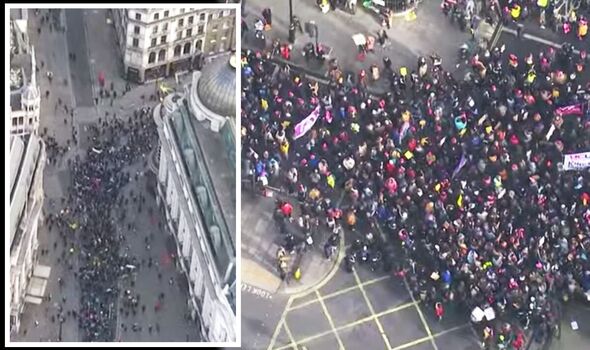More than 500,000 workers walk out in biggest strike action in a generation in the UK
Up to half a million British teachers, civil servants, train drivers and university lecturers walked out over pay and conditions on Wednesday in the largest coordinated strike action in Britain in a generation, causing widespread disruption.
The mass walkoutsacross the country shut schools, halted most rail services, and the military was put on standby to help with borderchecks.
About 300,000 teachers are expected to strike on Wednesday, the biggest group involved, as part of wider action by 500,000 people, the highest number for at least a decade.
Mary Bousted, General Secretary of National Education Union, told Reuters that teachers in her union felt they had no choice but to strike as declining pay meant high numbers were leaving the profession, making it harder for those that remain.
“There has been over the last 12 years a really catastrophic long term decline in their pay,” she said outside a school in south London.
“None of the people behind me want to be on strike today but they are saying, very reluctantly, that enough is enough and that things have to change.”
With inflation running at more than 10% – the highest level in four decades – Britain has seen a wave of strikes in recent months across different sectors, including health and transport workers, Amazon warehouse employees and Royal Mail postal staff.
Education minister Gillian Keegan stuck to the government’s position on Wednesday. It has taken a hard line with public sector workers, telling them that giving in to demands for large wage increases will only fuel inflation.
“What we cannot do is give inflation busting pay rises to one part of the workforce and make inflation worse for everybody. That’s not an economically sensible thing to do,” she told the BBC.
So far the economy has not taken a major hit from the industrial action with the cost of the strikes in the eight months to January estimated by consultancy firm the Centre for Economics and Business Research (CEBR) at about 1.7 billion pounds ($2.09 billion), or about 0.1% of expected GDP.
It put the estimated impact of the teachers’ strikes at about 20 million pounds a day.
But the strikes may be having a political impact on Prime Minister Rishi Sunak’s government.
His Conservative Party trail the opposition Labour Party by some 25 percentage points in polls and surveys indicate the public think the government have handled the strikes badly.
Reuters









No comments
Thanks for viewing, your comments are appreciated.
Disclaimer: Comments on this blog are NOT posted by Olomoinfo, Readers are SOLELY responsible for their comments.
Need to contact us for gossips, news reports, adverts or anything?
Email us on; olomoinfo@gmail.com